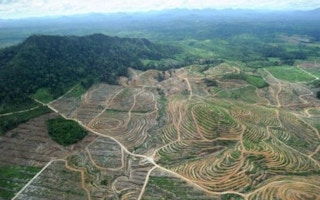Major palm oil producer Golden Agri-Resources Ltd (GAR) announced Monday it received membership to the industry body for sustainable palm oil, the Roundtable on Sustainable Palm Oil (RSPO). The membership came with strict conditions that GAR will have to meet before the company can be certified as a sustainable palm oil provider.
Singapore-based GAR is the world’s second largest palm oil plantation company and has a total planted area of 442,500 hectares and 40 mills in Indonesia. GAR is the parent company of Indonesian palm oil producers PT SMART and PT Ivo Mas Tunggal (IMT), both already members of the RSPO. PT SMART and PT IMT have a combined 103,953 hectares of plantations and 11 mills under review by the RSPO.
In September last year, the RSPO publicly reprimanded PT SMART for not complying with RSPO guidelines on clearing land and performing environmental impact assessments. The public statement followed an independent audit commissioned to investigate claims by NGO Greenpeace that PT SMART was illegally clearing forest of high conservation value (HCV) as well as peat lands.
The rapid deforestation of Indonesia’s forests, and particularly its carbon-rich peat forests, has put Indonesia among the top emitter’s of greenhouse gases. An estimated 80 per cent of Indonesia’s emissions are from deforestation and the conversion of peat lands.
At the time of the reprimand, RSPO’s grievance panel suspended the certification process for PT SMART and PT IMT plantations and mills, and recommended an action plan for GAR that included application for RSPO membership and the engagement of an independent NGO to help fix problems with the companies’ environmental and social impacts.
GAR applied for RSPO membership in November, and in February announced a new partnership with international NGO The Forest Trust (TFT). TFT’s role is to help the company prepare for RSPO certification.
GAR said it was committed to taking a leadership role in sustainable palm oil production. Toward this end, GAR has launched its Forest Conservation Policy and is in the process of developing its Yield Improvement Policy and Social and Community Engagement Policy in collaboration with TFT.
To date, TFT has prepared a report assessing the measures that GAR, PT SMART and PT IMT will need to take to qualify for RSPO certification. It has been submitted to the RSPO grievance panel for review.
While the report was sufficient to gain GAR’s acceptance as a member to RSPO, the industry body won’t restart the certification process for the companies until it reviews full reports on the problems that led to the suspension.
The new reports will provide recommendations to ensure the companies’ operations comply with the RSPO’s new planting procedures, and to avoid repeating past violations that led to the clearing of peat land or land of high conservation value (forests with a rich biodiversity or a strong ecological or social importance).
GAR brought in an independent verifier, the British Standards Institution (BSI), to audit operational procedures for GAR and PT SMART. The process is targeted for completion by March 2012.
In addition to reporting on amended operating procedures, GAR and its subsidiaries will submit a report to the RSPO by the end of April on the social impacts of their operations in Central Kalimantan. A team of researchers from Tanjungpura University (UNTAN) has been working on the report since November, and will make it publicly available in May.
Another research team will assess the group’s historical HCV land clearances. The report, compiled by faculty from Bogor Agricultural University (IPB), will be submitted to the RSPO by the end of April along with a proposed plan for remediation and compensation for illegally cleared HCV land.
The RSPO also requires a plan for the restoration of peat lands degraded by PT SMART and PT IMT operations. To this end, a Peat Restoration Team (PRT) consisting of staff from IPB and the Indonesian Center for Agricultural Land Resource Research and Development have assessed damaged peat lands in Ketapang, Central Kalimantan and Kapuas Hulu and will submit a restoration plan by the end of May.
The three companies plan to certify all of their plantations (held as of June 30, 2010) with the RSPO by 2015. Plantations acquired after June 30th will be dealt with separately.
RSPO certification, guided by a group of growers, environmental advocates and consumers, has a growing role in the international trade in palm oil. An expanding list of multi-national companies such as Unilever, Nestle and Burger King, have taken steps to ensure the palm oil included in their supply chains are sustainable. In November, the Netherlands became the first country to declare it would only import RSPO certified palm oil from 2015 onwards.
GAR managing director of communications and sustainability Peter Heng told Eco-Business that RSPO certification was a seal of approval. “There is a growing number of companies demanding responsibly produced products by only sourcing through traceable supply chains,” he said.
Bustar Maitar, head of Greenpeace’s Indonesian campaign, welcomed GAR’s recent efforts towards sustainability. He told Eco-Business, “Protecting Indonesia’s forests is good for business, the environment and future generations of all Indonesians. The need for all palm oil producers to clean up their act is now pressing, for business and environmental reasons.”
But joining the RSPO and meeting its standards is only the first step. “Membership and certification by the RSPO does not yet guarantee that companies are breaking the link between deforestation and palm oil,” he added.
Mr Maitar would like to see the RSPO make some improvements: “If the RSPO strengthened its standards, particularly on greenhouse gas emissions and became more rigorous in its efforts to ensure that all its members were implementing existing standards, then it would be a force helping (to break that link).
“GAR’s commitment just a few weeks ago now puts them ahead of most of the other companies who are part of the RSPO. The key challenge for GAR and its subsidiaries, regardless of RSPO membership, is that it now translates its commitments into practice.”

















